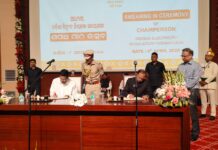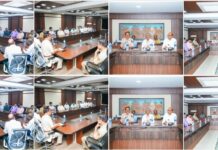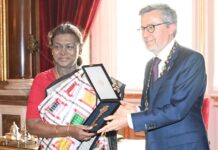By Our Correspondent
BHUBANESWAR: From a humble beginning over two decades ago, Siksha ‘O’ Anusandhan Deemed to be University in Bhubaneswar, known more by its acronym SOA, has emerged today as a shining academic edifice where quality education and innovative research are the buzzwords.
A socially inclusive institution of higher education, SOA has been churning out professionals in varied fields today ready for the requirements and challenges of different sectors. The core belief at SOA, ranked among the top twenty universities in the country this year, has been that a centre of higher learning must ignite the desire in the student to go through the process of learning not to get a job, but illuminate the society with his or her learning.The society’s need today, SOA feels, is of more number of people with humanitarian values who can answer the needs of the society.
SOA came into existence on July 17, 2007 when the HRD Ministry conferred on it the status of a Deemed to be University under Section 3 of the UGC Act, 1956. It has since grown to be regarded as a centre of superlative professional education with its focus on research and a strong academic foundation.
The multi-campus infrastructure of SOA is home to more than 12,000 students, including from six other countries, who have chosen the Deemed to be University to chart out a future for themselves.
Though just 13-year-old, SOA is being continuously counted among the top 25 universities in the country by the National Institutional Ranking Framework (NIRF), Ministry of HRD, for five consecutive years now. Ranked 20th in the country this year, it has also remained the top institution in the university category in Odisha for the fifth consecutive year obtaining a score of 53.10 this year.
NAAC, which has termed SOA as socially inclusive, has re-accredited it with the highest grade in recognition of its quality academic activities. Programs of SOA’s faculty of engineering and technology have been accredited by the prestigious Accreditation Board for Engineering and Technology (ABET), an internationally reputed US-based accreditation agency.
SOA was globally ranked recently when it found place in the Times Higher Education (THE) World Ranking. The Institute of Medical Sciences and SUM Hospital, SOA’s faculty of medical sciences was ranked 23rd in the country by NIRF this year. Incidentally, IMS is among nine medical colleges in India which have found place in the THE World Rankings list.
As per the NIRF rankings this year, SOA’s faculty of engineering and technology was placed 34th in India while its faculty of dental sciences was positioned 12th nationally.
IMS and SUM Hospital, a 1600-bed teaching hospital, was in the news recently when it was chosen by the Indian Council for Medical Research (ICMR) as a human trial centre for the much-awaited vaccine against the Coronavirus pandemic. The hospital, regarded today as one of the most favoured healthcare destinations in the east, is also the first hospital in Odisha to successfully undertake Bone Marrow Transplantation (BMT) and live donor liver transplantation. The USP of the hospital, which deploys excellent modern and advanced diagnostic, surgical and life- saving equipment, is that it extends quality medical facilities for patients at an affordable cost.
As the country was ensnared by the Covid-19 pandemic, a worldwide crisis today, SOA stepped forward to partner the Odisha government in setting up three full-fledged Covid-19 Hospitals and two Covid Care Centres (CCC).
While a 525-bed Covid-19 Hospital (with 25 ICU beds) was set up in its own campus in Bhubaneswar, two other hospitals with 176 and 150 beds respectively were being run by the university at Kendrapara and Talcher respectively. Doctors, nurses and para-medic personnel from the IMS and SUM Hospital were manning these facilities. The CCCs were established at Jatni and Jamujhari in Khurda district.
SOA offers 24 Under Graduate and 71 Post Graduate, 10 Post Masters, Ph.D. and Post-Doctoral programs in engineering and technology, management, medical sciences, dental sciences, nursing, pharmaceutical sciences, biotechnology, hospitality and tourism management, law and agricultural sciences.
SOA’s focus being on research, it has set up 13 research centres which have been working in 22 identified thrust areas. The centres include the Centre of Excellence in Theoretical and Mathematical Sciences, Multi-Disciplinary Research Center, Centre for Nano Sciences and Nano Technology, Centre for Applied Mathematics, Centre for Rural and Tribal Development, Centre for Reproductive Health, National MEMS Design Centre, Centre for Bio-Fuel and Bio-Processing and Centre for Environment and Climate.
Some of the ongoing research work is supported by grants sanctioned by several external agencies including the Department of Science and Technology (DST), Department of Biotechnology (DOB), Defence Research and Development Organisation (DRDO), Science and Engineering Research Board (SERB), Life Science Research Board (LSRB) and Council for Scientific and Industrial Research (CSIR). Thirtyeight laboratories have been attached to the Research Centres. Work of the faculty members and research scholars regularly get published in reputed peer reviewed international journals.
The university has 4839 Scopus indexed publications to its credit so far with H-index of 54. Researchers at SOA have so far applied for 99 patents of which 72 have been published and patents granted in five cases. Four of these patents related to the Centre for Nano Sciences and Nano Technology.
The infrastructure developed by the university includes a 1400-seat stateof-the-art convention hall which is today the preferred venue for many international and national level conferences. SOA’s 127 acre fully wi-fi campuses have a total built up area of nearly 4.5 lakh square meters and has 197 e-enbaled class rooms, 340 PG and UG labs, fully automated libraries with ample Print Learning Resources, 10 student activity centres and multiple ISP connectivity (more than 2Gbps). It has one central library, 9 institutional and 42 departmental libraries. The central library has a floor area of 11,617 square meters.
‘Jaago’, an initiative of the university with students at the forefront, has been working among slum children taking care of their education, nutrition and hygiene. SOA has also been in the forefront of extending assistance to the authorities in providing food, masks, sanitisers etc to around 20,000 people daily in and around Bhubaneswar in the wake of the Covid-19 outbreak.



























